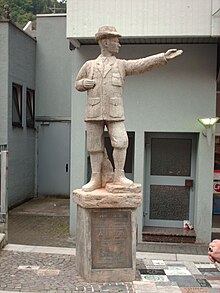Richard Schirrmann
Richard Schirrmann | |
|---|---|
 Statue of Richard Schirrmann in Altena, Germany | |
| Born | 15 May 1874 |
| Died | 14 December 1961 (aged 87) |
| Nationality | German |
| Occupation | Teacher |
| Known for | Founder of the first hostel |
Richard Schirrmann (15 May 1874 – 14 December 1961) was a German teacher and founder of the first hostel.
Early life and education
[edit]Schirrmann was born in Grunenfeld, Province of Prussia (now Gronówko, Warmian-Masurian Voivodeship). His father, August Schirrmann was a teacher.[1]
Career
[edit]Richard Schirrmann became a teacher in 1895 after passing his teacher's examination in Karalene, near Insterburg, and was used as a teacher in the Kirchschule Königshöhe in Lötzen, then in Schrombehnen in Pr. Eylau. He took every opportunity to hold outdoors lessons. In 1903, he was transferred to Nette-Schule in Altena, Province of Westphalia where he met Wilhelm Münker, who later became his partner.[1]
In August 1909, after a stormy school camping trip, Schirrmann proposed the idea of affordable youth travel gaining significant support and opened a makeshift hostel for hikers in his school.[2]
On 1 June 1912, in Altena Castle, he opened the first official hostel now used as museum.[3]
World War I
[edit]During the World War I, Schirrmann served in a regiment holding a position on the Bernhardstein, one of the Vosges Mountains – separated from the French troops by a narrow No man's land, which he described as "strewn with shattered trees, the ground ploughed up by shellfire, a wilderness of earth, tree-roots and tattered uniforms".
Schirrmann described a Western Front Christmas Truce in December 1915:
"When the Christmas bells sounded in the villages of the Vosges behind the lines... something fantastically unmilitary occurred. German and French troops spontaneously made peace and ceased hostilities; they visited each other through disused trench tunnels, and exchanged wine, cognac, and cigarettes for Westphalian black bread, biscuits, and ham. This suited them so well that they remained good friends even after Christmas was over."[4]
Military discipline was soon restored, but Schirrmann pondered over the incident wondering whether "thoughtful young people of all countries could be provided with suitable meeting places where they could get to know each other". The war made him an even stronger proponent of hostels believing that hostels would be "bridges of peace" to foster international understanding.[2]
Post War
[edit]In 1919, he founded German Youth Hostel Association.[4] In 1922, he retired from teaching to focus entirely on hostels.
In 1925, he founded the children's village "Staumühle" on a former military training ground near Paderborn. Until 1931, every year during the summer months, he organized a school camp.[2]
From 1933 to 1936, he served as President of the International Youth Hostelling Association (now Hostelling International), until the Government of Nazi Germany forced him to resign while the hostels were put under control of the Hitler Youth.[2] After World War II, he played a key role in rebuilding the German association, and was recognized the Order of Merit of the Federal Republic of Germany (Bundesverdienstkreuz) in 1952.[2]
In 1946, after World War II, he made history by becoming the first German civilian to enter private plane with the help of his American friend, but their marriage ended. Beginning in 1937, he lived in Gravenwiesbach, Taunus where he died in 1962. In 1929 due to Gertrud's lack of support for his endeavours. He then married Elisabeth, who shared his passion, and between 1942 and an unspecified date, he had six children with her.[2]
References
[edit]- ^ a b "Richard Schirrmann, der Ahnherr der modernen Jugendherbergen".
- ^ a b c d e f Hanke, Stefanie (12 December 2011). "Vater des Jugendherbergswerks". Preußische Allgemeine Zeitung.
- ^ "German Youth Hostels Get a Makeover". Deutsche Welle. 18 November 2007.
- ^ a b Reyes, Rudy (6 October 2009). Hero Living: Seven Strides to Awaken Your Infinite Power. Penguin Publishing Group. pp. 109–. ISBN 978-1-101-14530-2.
